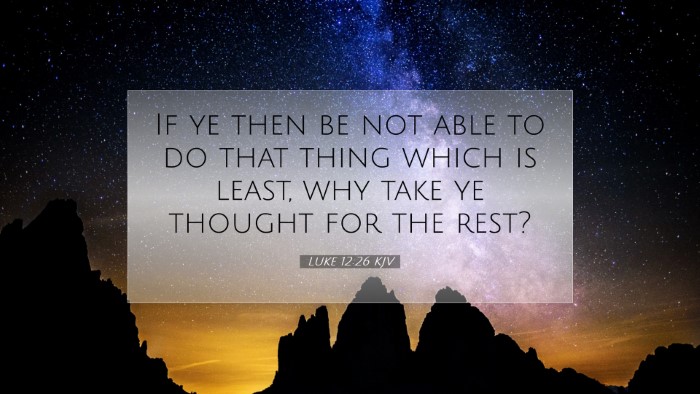Commentary on Luke 12:26
Bible Verse: Luke 12:26 - "If ye then be not able to do that thing which is least, why take ye thought for the rest?"
Introduction
In this passage, Jesus addresses the futility of anxiety and worrying about the material concerns of life. This verse is part of a broader teaching on faith and reliance on God’s provision. As scholars and reverent servants of God examine this verse, they unveil profound insights that highlight the tension between human concern and divine sovereignty.
Contextual Analysis
The context of Luke 12 reveals Jesus teaching about distrust in God’s provision and the perils of materialism. This particular section follows a series of admonitions where Jesus encourages His followers to relinquish earthly worries and place their trust in God. Here, He emphasizes the insignificance of worrying over what cannot be controlled, particularly in regard to life’s pressing needs.
Framework of Exposition
- Divine Sufficiency: God is able to meet every need.
- Human Limitations: Human effort is often inadequate.
- Call to Trust: An invitation to deepen faith in divine care.
Thematic Insights
1. Divine Sufficiency
Matthew Henry notes that if individuals are unable to manage the lesser matters of life, it reveals their limits in dealing with greater circumstances. Instead of fretting about their daily needs, believers should trust in God’s ability to provide for them. Albert Barnes emphasizes that this is a reflection on human capacity versus divine omnipotence. God cares for His creation and will provide for the essentials of life.
2. Human Limitations
Adam Clarke suggests that the quest for control often leads to greater anxiety. The admonition questions the efficacy of worry; if one cannot accomplish what is “least” or consider the small matters consistently, it stands to reason that worrying over the greater ones is equally ineffective. This elucidates the impermanence and transience of human agency in the grand design of God’s providence.
3. Call to Trust
The final appeal in this verse directs individuals to practice faith. A life of trust is essential for believers. They must understand that life’s stresses should not dictate their status with God or their faith journey. Pastors and theologians glean from this assertion the profound truth that reliance on God’s care leads to genuine peace and purpose, a theme reiterating throughout the Gospels.
Practical Applications
For pastors and church leaders, Luke 12:26 offers rich teaching material. It speaks volumes about the need for believers to recalibrate their faith relative to their anxieties. There are a few applicable takeaways:
-
Encouragement in the Pulpit: Encourage congregants not to be burdened by worry but to trust in God’s provision.
-
Discernment in Counseling: Provide biblical counsel for those struggling with anxiety, guiding them to a place of trust in God.
-
Teaching Faith Practices: Instill practices of prayer and reliance on God, pointing to His faithfulness through biblical narratives.
Conclusion
In conclusion, Luke 12:26 serves as a profound reminder of the futility of human worry versus divine provision and sovereignty. The commentaries by Henry, Barnes, and Clarke collectively illuminate a path toward deeper faith and reliance on God. For theologians, students, and pastors alike, this verse beckons them to cultivate a spirit of trust and serenity amidst life’s uncertainties. By focusing less on anxiety and more on reliance on God, believers can live in the freedom that comes from knowing that their needs are met by a loving and sovereign Father.


